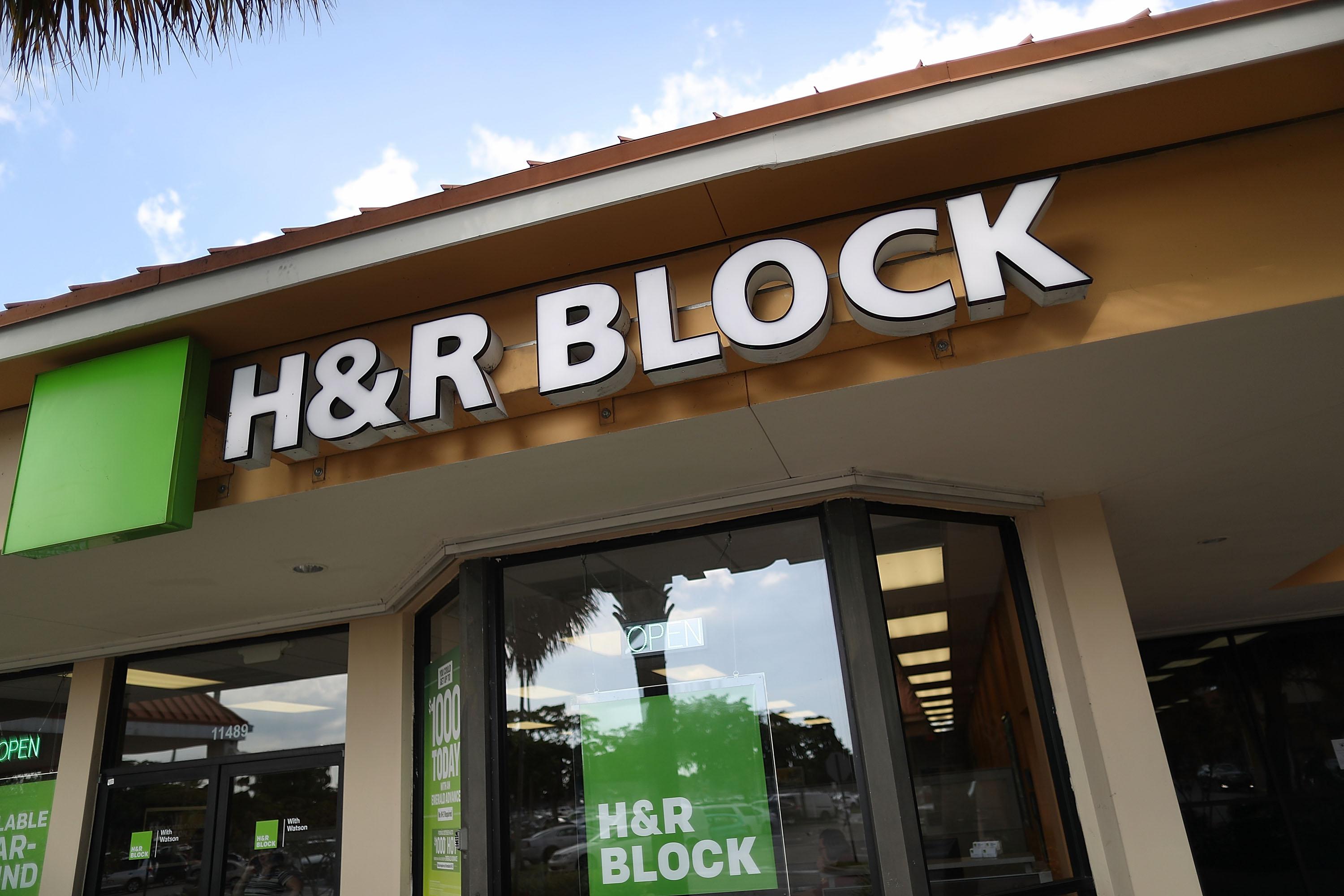Tax season is officially upon us, and tax-prep companies like H&R Block and Jackson Hewitt are among several services that are pushing this perk to customers: tax refund advance loans. These loans are often marketed as a free way to get your refund sooner, but is getting an early refund as good a deal as it sounds - or is it just a high-cost, short-term cousin of the good old payday loan?
MagnifyMoney did some digging around to give you the lowdown on refund advances. Here's what you need to know.
The checkered past of refund anticipation loans
These so-called "refund anticipation loans," as they were once called, aren't exactly new. They've been around since the late '80s, when e-filing was just picking up momentum.
According the U.S. Census Bureau, these loans typically came with triple-digit APRs and hefty fees. What's worse, 2009 data put out by the IRS suggested that these loans were marketed mainly toward low-income taxpayers. And more often than not, they were presented in ways that were misleading and falsely advertised, according to the National Consumer Law Center (NCLC).
Not surprisingly, refund anticipation loans grew to be a source of consternation among consumer advocates. To carry them out, tax-prep companies would take their cut, then deposit the remainder of the refund into a temporary bank account that the taxpayer typically accessed via a prepaid bank card.
Fortunately, these loans became a thing of the past in 2012 amidst major outcry from consumer advocacy groups like the NCLC and others. Ira Rheingold, executive director of the National Association of Consumer Advocates, tells MagnifyMoney that they were as predatory as payday loans.
"Thanks to consumer complaints and government action, things have gotten somewhat better, but these refund anticipation loans were known for sky-high interest rates and exorbitant fees," he says.
How today's tax refund advances work
These days, refund anticipation loans have been rebranded as tax refund advances. But the change runs deeper than just the name. According to top tax-prep servicers like H&R Block, Jackson Hewitt and Liberty Tax, these revamped products are 100 percent free for those who qualify. Advance amounts range depending on eligibility, but Liberty Tax is offering as much as $3,250.
Tax-prep servicers are exceptionally tight-lipped when it comes to the qualifying criteria. (See our handy chart below.) H&R Block is the most forthcoming, but there are still a lot of question marks. Their website says eligibility requirements include providing proper identification and having a "sufficient" tax refund, whatever that means.
However, there are a few things that could get you declined, including having bad credit, failing to present relevant tax forms like W-2s and 1099s, or not meeting certain income requirements, among other things. If you are approved, the loan amount is deposited into a temporary bank account you can access with a prepaid debit card, unless the servicer offers a direct deposit option. Either way, the loan itself is indeed fee-free and has a 0 percent APR.
Be that as it may, experts still encourage consumers to approach with caution.
"From the perspective of the consumer, I'd say they need to be very skeptical," Adam Rust, director of research at consumer advocacy group Reinvestment Partners and managing director of the nonprofit WiseWage, said "Private companies don't provide free services and banks don't make free loans."
Tax advances are indeed more accurately described as loans. The cash actually comes from banks, which are reimbursed when your refund comes in. In order to offer these advances, Rust says tax-prep companies cover the bank fees, essentially making them free for the consumer.
"It's actually a cost item for the preparers, which is one more reason to suspect that these loans aren't really free," he said. "The price may say free, but that doesn't mean it can't be recovered within the cost of the tax prep."
This is where things get a little less transparent. H&R Block declined a phone interview with MagnifyMoney, so I called up my local storefront and asked if there's an additional charge for getting a tax refund advance. In other words, will my tax preparation fee be the same whether I get a refund advance or not? I was told it would be, but locking down an accurate estimate for the service isn't easy.
According to the National Society of Accountants, the average tax-prep fee for federal and state returns during the 2017 filing season was $273 for folks who itemized their deductions; $176 for those who didn't. The takeaway here is that the complexity of the return appears to increase consumer costs. To get an actual estimate, you'll need to present your tax information, but the price you're quoted is likely to vary.
In 2016, consumer advocacy group Georgia Watch sent mystery shoppers into paid tax-prep firms in low-income neighborhoods in southwest Atlanta. What they found was "a stunning lack of knowledge and professionalism from preparers, vast inconsistencies in preparation fees, and a wide range of outcomes given the same inputs at each site."
Rheingold, who was not involved in the research, isn't all that surprised by the findings.
"The quality of tax preparers in high-volume firms is often pretty poor," he said.
Hidden costs to look out for
Refund transfers
If you're declined for a tax refund advance loan, some tax preparation companies may offer you a concession prize: the chance to get a refund transfer.
A tax refund advance may be advertised as free, but the same can't be said for a refund transfer.
Instead of paying your tax-prep fees at the time of service, you can defer it with a transfer. The tax preparer essentially creates a short-term account where your refund is deposited, at which point they'll take their fee directly. H&R Block charges $39.95 for a federal refund transfer. It's called an assisted refund at Jackson Hewitt, where it'll run you $49.95. Meanwhile, Liberty Tax says you have to "consult your tax office" for pricing details.
It's marketed for its speed and convenience, but Rust says taxpayers should think twice before opting in. Almost half of Liberty Tax's filers last year ended up getting a refund transfer, according to the company's 2017 annual report.
"That's really telling to me because the refund advance is marked as free, but the refund transfer isn't," Rust said. "So why are so many people paying for the transfer?"
What Rust is getting at is that it appears as though the lure of a free refund advance gets people in the door, at which point they're sold on the refund transfer after getting declined. Since offering these loans is a cost product for tax-prep companies, Rust says it's a fair assumption.
The cost of accessing your funds
Prepaid debit cards essentially serve as substitute checking accounts for those who don't have one. Many tax preparation companies offer prepaid debit card products that customers can sign up for in order to have their tax refunds deposited there. However, these cards my carry additional fees that can eat away at the value of the tax refund itself.
"One of the things we've seen is the growth of prepaid debit cards to access your refund advance," said Rheingold. "Accessing your money through an ATM [often] comes with fees, which means you're being charged to access your own money."
Jackson Hewitt puts refund advance funds on the American Express Serve Card if you're not doing a direct deposit into your checking account. H&R Block goes with the Emerald Prepaid Mastercard, and Liberty Tax uses a Netspend prepaid Mastercard.
Alternatives to a tax refund advance
You can always file earlier to expedite the arrival of your refund. Without a tax refund advance, most folks who file electronically can expect their refund in less than three weeks, according to the IRS. The most common cause for delay is if you're claiming the Earned Income Tax Credit or the Additional Child Tax Credit, which will push your refund at least into late February.
Either way, for simple returns where the filer is only bringing in a W-2 and not itemizing, Rust says most preparers can probably complete the job in less than 90 minutes.
"Should that cost more than $200? Should the chance of receiving an advance justify spending that much when, instead, a low-income filer could go to a VITA site and have their return prepared for free?" he asked.
Rust is referring to the IRS Volunteer Income Tax Assistance program, which offers free tax preparation for people who earn $54,000 or less per year. Those who are above the income threshold can also opt for out-of-the-box software like TurboTax. Prices vary here depending on the complexity of your return, but it's generally much cheaper than going with a storefront tax preparer.
MORE FROM MAGNIFYMONEY
MagnifyMoney is a price comparison and financial education website, founded by former bankers who use their knowledge of how the system works to help you save money.


